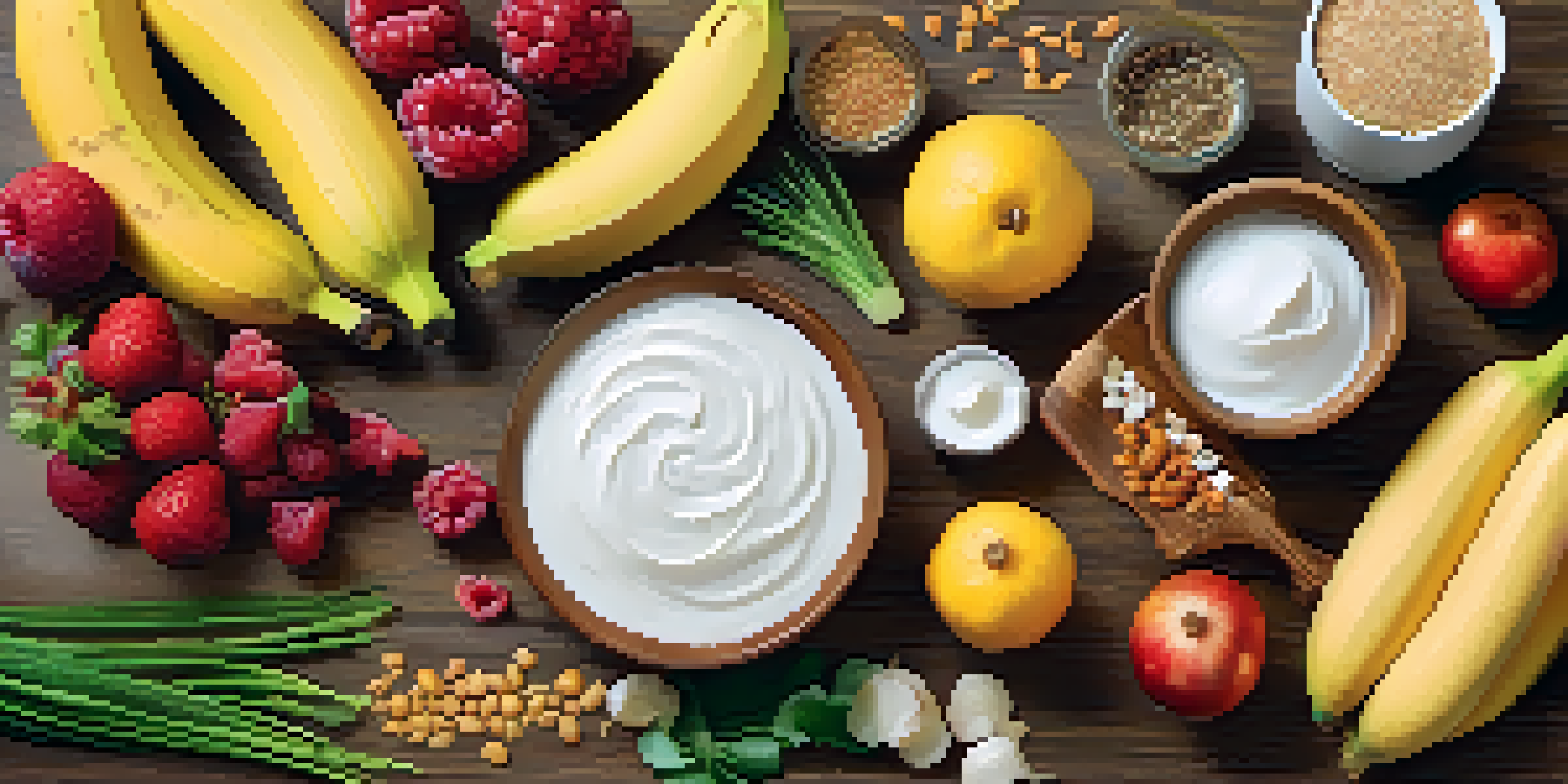The Impact of Diet on Gut Microbiome and Naturopathy

Understanding the Gut Microbiome: An Overview
The gut microbiome consists of trillions of microorganisms living in our digestive tracts. These tiny creatures play a crucial role in digesting food, absorbing nutrients, and even influencing our mood. Think of them as a bustling city, where each microbe has its own unique role, contributing to the overall health of the ecosystem.
The gut microbiome is a key player in our overall health and well-being, influencing everything from digestion to mental health.
Research indicates that a diverse microbiome is essential for good health. Just like a city thrives on a mix of different cultures and industries, our gut benefits from a variety of bacteria and other microorganisms. A diverse microbiome can help fend off diseases, improve digestion, and support immune function.
Conversely, a less diverse microbiome can lead to health issues, including obesity, diabetes, and inflammatory bowel diseases. Therefore, understanding how our diet influences this microbial community is vital for maintaining our overall health.
The Role of Diet in Shaping the Microbiome
What we eat has a significant impact on our gut microbiome. Diets rich in fiber, for example, promote the growth of beneficial bacteria that help with digestion and nutrient absorption. Foods like fruits, vegetables, whole grains, and legumes act as fuel for these helpful microbes, allowing them to flourish.

On the flip side, diets high in sugar and unhealthy fats can lead to an imbalance in gut bacteria. This imbalance is akin to overpopulation in a city, where harmful bacteria can begin to outnumber the beneficial ones, leading to various health problems. Therefore, making mindful dietary choices is critical for maintaining a healthy microbiome.
Gut Health Depends on Diet Diversity
A diverse diet rich in fiber and fermented foods supports a healthy gut microbiome and overall well-being.
Incorporating fermented foods, such as yogurt, sauerkraut, and kimchi, can also enhance gut health. These foods contain live probiotics, which are beneficial bacteria that can help restore balance in the microbiome, much like adding new residents to a city to enrich its culture.
Naturopathy: A Holistic Approach to Health
Naturopathy is a holistic healing approach that emphasizes the body's inherent ability to heal itself. Practitioners often focus on natural remedies and lifestyle changes, including diet, to promote wellness. This approach aligns well with the understanding of how diet impacts our gut microbiome.
Food is not just fuel; it's information. It talks to your DNA and tells it what to do.
By integrating diet into naturopathic practices, practitioners can help patients restore balance to their microbiomes. This might involve personalized dietary recommendations, such as increasing fiber intake or incorporating specific probiotics. The goal is to not only address symptoms but to enhance overall health.
Naturopathy also considers the emotional and psychological aspects of health. Just as our diet can impact our microbiome, our mental state can influence our food choices. This interconnectedness highlights the importance of a well-rounded approach that nurtures both body and mind.
The Importance of Probiotics and Prebiotics
Probiotics and prebiotics are two key components in maintaining a healthy gut microbiome. Probiotics are live bacteria found in certain foods and supplements that can help restore balance in the gut. On the other hand, prebiotics are non-digestible fibers that serve as food for these beneficial bacteria.
Incorporating both into your diet can be likened to planting seeds in a garden. Probiotics introduce new beneficial microbes, while prebiotics nourish and help those microbes grow. Together, they create a flourishing ecosystem in your gut that supports your overall health.
Probiotics and Prebiotics Matter
Incorporating probiotics and prebiotics into your diet helps maintain a balanced gut ecosystem essential for health.
Common sources of probiotics include yogurt, kefir, and fermented vegetables, while prebiotics are found in foods like garlic, onions, bananas, and asparagus. A balanced intake of both can lead to improved digestion, enhanced immune function, and even better mental health.
Foods That Support Gut Health
Certain foods are particularly beneficial for gut health and can help maintain a balanced microbiome. For instance, high-fiber foods like oats, beans, and berries promote the growth of good bacteria. These foods can be thought of as the building blocks that support the entire structure of gut health.
In addition to fiber, foods rich in omega-3 fatty acids, such as fish and flaxseeds, can also support gut health. Omega-3s have anti-inflammatory properties that can help soothe the gut lining, much like a soothing balm for irritated skin. Incorporating a variety of these foods into your diet can make a significant difference.
Moreover, avoiding ultra-processed foods and excessive sugar can further benefit your gut. These foods can harm beneficial bacteria and lead to an imbalance, so opting for whole, natural foods is a wise choice for maintaining gut health.
The Link Between Gut Health and Mental Well-Being
There's a fascinating connection between our gut health and mental well-being, often referred to as the 'gut-brain axis.' Research shows that the gut microbiome can influence our mood and cognitive function, highlighting the importance of a healthy diet. Just as a thriving city supports its residents' quality of life, a healthy gut can enhance our mental health.
Certain gut bacteria produce neurotransmitters, such as serotonin, which plays a crucial role in regulating mood. This means that what we eat can directly affect how we feel. For instance, diets rich in whole foods and probiotics may help reduce symptoms of anxiety and depression.
Gut Health Affects Mental Wellness
The connection between gut health and mental well-being underscores the impact of diet on mood and cognitive function.
Conversely, an unhealthy gut can contribute to mental health issues. When the microbiome is out of balance, it can lead to inflammation, which is linked to various mental health disorders. Thus, nurturing our gut through diet can have a profound impact on our emotional well-being.
Practical Tips for Improving Gut Health Through Diet
Improving gut health doesn't have to be overwhelming; small changes can lead to significant results. Start by incorporating more fiber-rich foods into your meals, such as fruits, vegetables, and whole grains. These foods help feed the beneficial bacteria in your gut, promoting a healthier microbiome.
Additionally, consider adding fermented foods to your diet. Including items like yogurt, kefir, or kombucha a few times a week can introduce beneficial probiotics to support gut health. It's a simple way to enhance your diet and overall wellness.

Lastly, stay hydrated and limit processed foods and added sugars. Drinking plenty of water helps digestion and overall bodily functions, while minimizing processed foods can reduce harmful bacteria in your gut. With these practical steps, you can take charge of your gut health and, in turn, support your overall well-being.